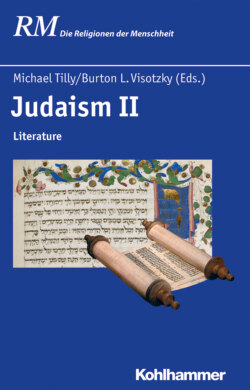Читать книгу Judaism II - Группа авторов - Страница 82
На сайте Литреса книга снята с продажи.
10 Flavius Josephus
ОглавлениеJosephus was born in Jerusalem in 37/38 CE as the son of prominent parents in the priestly aristocracy. He died in Rome after 100 CE. His main literary objectives lay in the defense of Judaism and in the religious interpretation of the history of his people for the time after the destruction of the Second Temple (70 CE). Four of his works, in Greek, were written in the last decade of the first century CE.73
Earliest is his Jewish War (De bello Iudaico), in seven books, giving a detailed account of the war’s historical background and results, as a way of overcoming this national disaster and helping to prevent any repetition in the future. The original Aramaic version of the Jewish War is lost; the version we now have was written by Josephus in Greek with outside help.
Next, Josephus wrote his extensive, Jewish Antiquities (Antiquitates Iudaicae). Writing in the style of contemporary historical writers and influenced by motifs from Stoic philosophy, he gives an account of Jewish history in twenty books. With a detailed retelling of the Torah and Prophets, as well as using other sources, he describes how Judaism developed from the creation of the world to the outbreak of the Jewish War in the year 66 CE. Josephus sets out how Jewish laws and customs came into being and who was responsible for them.
Josephus wrote his autobiography (Vita) as a brief appendix to the Jewish Antiquities. Here, in earnest debate with his rival, the chronicler Justus of Tiberias, he tells of his priestly background, his personal journey, and his career to date (in particular his active participation in the Jewish War), in order to demonstrate his credentials as a historian and military general.
In his last writing still extant, the ancient Jewish author wrote a passionate defense of Judaism presented in two books Against Apion (Contra Apionem), in which he defends himself against the dissembling malice of Jewish-hostile authors such as the Alexandrian grammarian Apion. Josephus accused them of grave errors: lack of agreement, lack of devotion to the truth, and the insufficient age of their sources. The work contains numerous valuable excerpts from the extensive writings of well-known ancient historians such as Manetho, Menander, and Berossus, whose work is preserved nowhere else.
While Josephus soon fell out of favor in Judaism as a traitor, the early Christian church already showed great interest in the transmission of his works. In particular, the Church Fathers saw the Jewish War and its detailed description of the siege and destruction of Jerusalem in the year 70 CE as evidence for the predictions of Jesus about the end of the second temple (Mk 13:1f.).
Josephus closely observed many events and recorded numerous authentic documents and sources. As a scion of the priestly Jerusalem elite, he offers reliable information from Jerusalem temple circles and shows how deep-seated was the interweaving of ancient Judaism with Hellenistic culture. He is one of the most important witnesses for the elucidation of the understanding of Scripture, of the cultural and religious movements, political processes and events, as well as everyday Jewish life in Palestine and in the Diaspora in the first century CE.
The present survey of the Jewish literature that came into being in the Hellenistic-Roman period shows that the texts preserved from the Land of Israel and the Diaspora both reflect the ongoing conflicts and congruences between the received biblical/Jewish tradition and contemporary Hellenistic culture. In addition, the texts presented here witness that precisely this cultural encounter produced highly diverse literary forms and content, which reflect the religious, cultural, and social heterogeneity of ancient Judaism.
